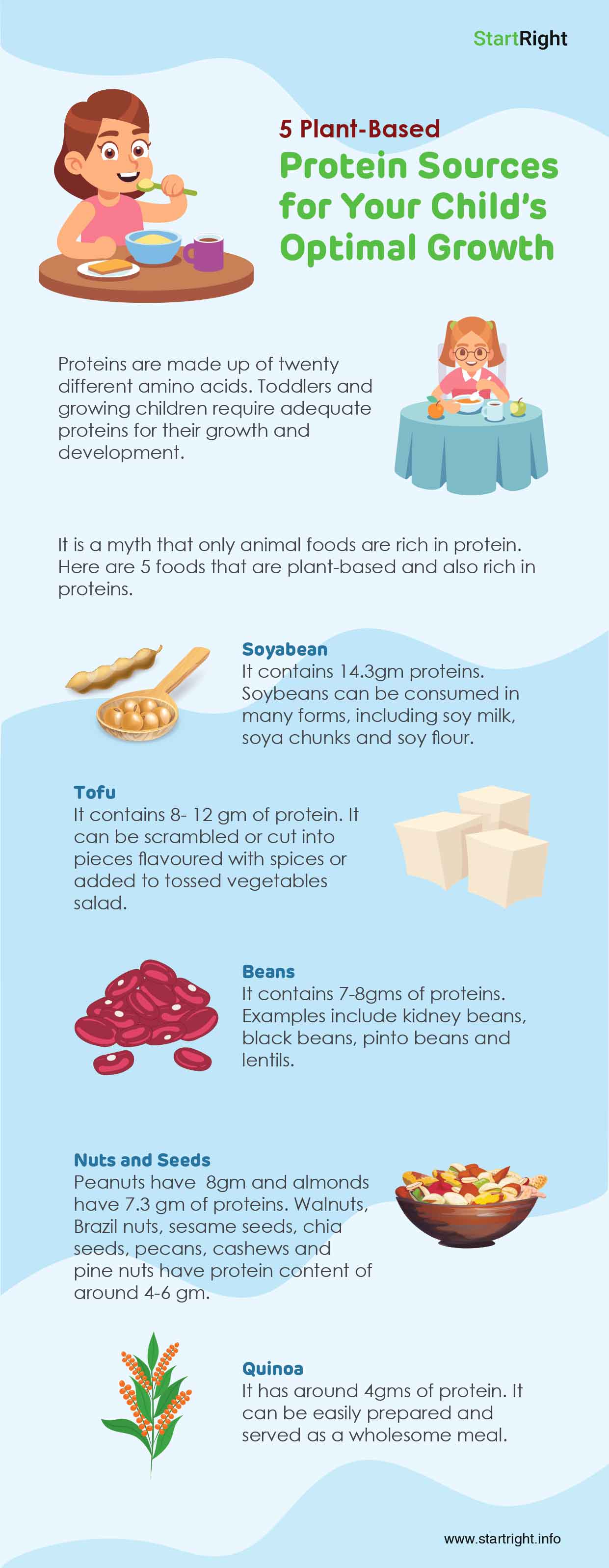5 Plant-Based Protein Sources for Your Child’s Optimal Growth
Proteins are made up of twenty different amino acids. Some of these are synthesized in the human body, others are not and are hence known as essential amino acids. Proteins from animal foods and soyabean match those synthesized in the human body and are known as complete proteins, however plant foods like grains, beans and nuts are deficient in at least one of the amino-acids, hence known as incomplete proteins.
Toddlers and growing children do require adequate proteins for their growth and development. While fruits have minimal proteins and oils do not have any, other plant foods have at least one essential amino acids. Therefore, people on plant-based diets must include a variety of food items in their diet, to meet their daily protein requirements.
Infographic Click Here | To figure out how much protein you need, start by dividing your weight by 2.2, which gives you your weight in kg. Here is a basic example which may help: 100 lb/2.2=45.5 kg. Once you have this number, multiply your new-found weight in kg by 0.8 (45.5 kg * 0.8 = 36 gms protein). If you are very active you may want to use 1 or 1.2 instead of 0.8 depending on the intensity/frequency of the activity. On similar terms you can calculate the protein requirement of your child |
Here are 5 protein rich plant sources which can help your growing child:
1) Soyabean: Soyabeans contain the highest amount of protein amongst all plant sources – a whooping 14.3gm. Soy milk is rich in protein and easily replaces animal milk. Soya chunks are one of the best finger foods and soya flour can be used to make bread and also can be added to whole wheat flour to fortify it.
2) Tofu: Tofu is another protein rich source containing 8-12 gm of protein, depending upon the texture. It easily replaces the need for cottage cheese and is a favourite amongst all groups of kids. It can be scrambled or cut into pieces flavoured with spices or added to tossed vegetables salad.
3) Other beans: Kidney beans, black beans, pinto beans, and lentils when cooked are full of proteins. They contain about 7-8gms of proteins. Sprouted beans can be used in salad to increase the nutrient content.
4) Nuts and Seeds: Peanuts top this list with 8gms of proteins, closely followed by almonds at 7.3 gms. Walnuts, brazil nuts, sesame seeds, chia seeds, pecans , cashews and pine nuts have protein content of around 4-6 gms.
Nuts can be consumed as a whole snack or added to salads, pies, and cakes. Roasted nuts are favourite amongst teens. Care should be taken while introducing them to your child since many nuts are known to be allergens and may trigger an allergic reaction.
5) Quinoa– Quinoa has the highest protein content amongst the grains with around 4gms of protein. It can be easily prepared and served as a wholesome meal.
Plant-based diet is healthy, wholesome and contains variety of options to choose from. Not only your diet is enriched with proteins, but your body will also get benefits from the antioxidants and phytochemicals in the plants.
References:
- https://dreenaburton.com/plant-powered-kids-feeding-vegan-babies-and-toddlers-food-introduction-from-6-24-months
- https://babyfoode.com/blog/15-healthy-finger-foods-for-toddlers/
- Vegan for Life: Everything you need to know to be Healthy and Fit on a Plant Based Diet- Jack Norris and Virginia Messina








































